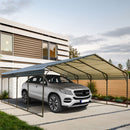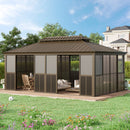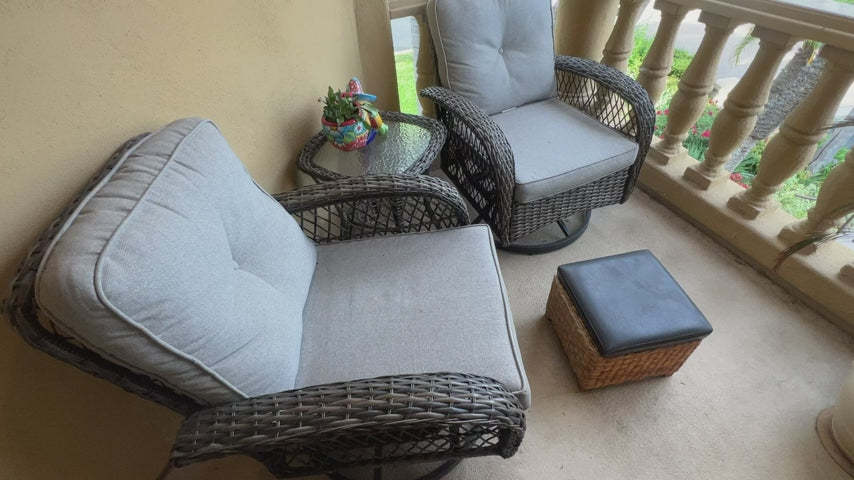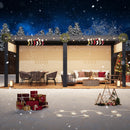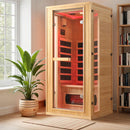For Beginners: How to tent camping in winter

The summer heat has gone, autumn and winter are gradually arriving. Many people hesitate to go camping due to the cold weather, but if you have prepared properly, you’ll discover a brand new camping experience. Imagine you sleep under the quiet snowy nights with a starry sky, and the crackling fire burning by your side, how cozy it is! Are you now a little bit interested in starting the adventure of winter camping? Let's see what we need to prepare for the tent camping in cold weather!
Why You Should Try Winter Tent Camping
The biggest difference between tenting in cold weather and camping in spring or autumn lies in the natural environment and temperature changes. The drop in temperature reduces the annoyance of summer insects and you will not get bitten. And when the weather gets cooler, more and more people will prefer to stay at home, which allows you to escape from the crowds and fully enjoy your time alone.

And if you go to a place that snows, then you'll view a completely different natural landscape compared to other seasons. The thick snow has the function to absorb sounds, which brings quietness to your surroundings. If you light a campfire at this time, you can enjoy the peacefulness of lying beside the flames under the beautiful starry winter night. What’s more, the snow allows you to enjoy a variety of unique outdoor activities. You can build snowmen, go sledding and ice-fishing etc, which can’t be enjoyed in spring or autumn season.
Choose a Winter Tent
Now that you recognize the charm of tent camping in winter, before you start the adventure, the first thing to make sure is that you have chosen a suitable tent for the cold conditions.
Based on Environment
Generally speaking, for winter camping, depending on your destination, you can consider choosing either a 3 season or a 4 season tent.
- 3-Season Tent
3-season tents are typically lightweight and breathable. And they can resist wind and rain, which makes them suitable for outings in non-winter seasons. Compared to 4-season tents, 3-season tents may not be as structurally stable, and their roof designs might not be able to support the weight of accumulated snow. Additionally, the breathable panels may have big mesh holes that can’t keep tents warmth as effectively. But if you're going to a place where winter temperatures doesn’t drop much and there’s no terrible rain or snow weather, then choosing a 3-season tent that can be reinforced will be an economical option.
4-season tents typically feature steeper or dome-shaped roofs, which can effectively prevent snow accumulation. To keep warmth inside the tent, they will have smaller mesh panel holes. And they use materials sturdier than 3-season tents to enhance the stability of the whole tent. As a result, they tend to be heavier. So, if you choose to bring a 4-season tent in a winter camping, you’d better practice assembling it at home in order to avoid the panic caused by first assembly at outside.

Based on Accommodation
Besides the environment, you should also consider the number of people. An appropriately sized tent will reduce the difficulty of travelling. If you go alone then one person winter tent will be fine. If you have a group of people then a larger tent will be better. If you take a lot of camping gear or clothing with you, then choose a little bigger tent will provide more space and comfort.
Pick Winter Camping Gear
After you decide a suitable tent, what winter camping gear should be prepared? As outdoor temperatures are lower in winter, especially at night, and you may encounter rain or snow when camping in the winter in a tent, the most important thing is to stay warm and dry.
Sleeping Pads
Sleeping pads serve to provide cushioning, insulation, and protection from the cold ground, particularly in snowy conditions. They can generally be divided into three categories: air, self-inflating and closed-cell foam.
When choosing a sleeping pad, insulation capabilities will be noticed first, which can be measured by R-value. The higher the R-value, the better the insulation and warmth of the sleeping pad. For winter camping, the most comfortable camping sleeping pad should be with an R-value of around 4.0 or higher.
If you are going extreme cold weather camping, when a single sleeping pad still doesn't provide enough warmth, you can also consider placing a closed-cell foam pad underneath an inflatable pad for added insulation.
Sleeping Bags
Sleeping bag is another essential you should prepare for the winter camping. They will add 2-degree increase in temperature which can significantly enhance your comfort at night. When selecting a sleeping bag, you can turn to down bags first because they are lighter and warmer than other materials when the weight is equal. If you still need more warmth, you can add a liner inside the sleeping bag.
Ground Sheets
If the destination is wet and snowy, then waterproof ground sheets are also essentials for cold weather camping. They block the water and coldness from the ground, helping to maintain a comfortable temperature inside the tent.
How to Heat a Tent Safely?
As outdoor temperatures can drop rapidly at night in winter, how to stay warm in a tent becomes important. Of course you can use a generator to power some heaters, but sometimes you will find it difficult to get electricity outside. At this time, you can rely on traditional methods to retain warmth.
Electric Heaters
If your campsite has electricity, or you have a generator, you might consider using a space heater. And generally you can choose convection heaters or radiant heaters. Convection heaters use a fan to blow hot air into the tent, and radiant heaters heat objects in front of them. Besides heaters, an electric blanket can also help to keep warm.
Non-Electric Options
If you can't get electricity, you can try traditional heating methods, such as filling a bottle with hot water or heating stones to retain warmth. Remember to place the hot water bottle near your core positions like groin rather than at your toes, as the blood flow in that area will help warm your entire body. In addition, you can use a wood stove, but please make sure your tent has a designated vent for exhaust.

Conclusion
Now you should have a good understanding of winter camping, and perhaps you’re looking forward to a new adventure. With the right gear and knowledge, you can enjoy the beauty of winter while staying warm, dry, comfortable and secure. Happy camping!






